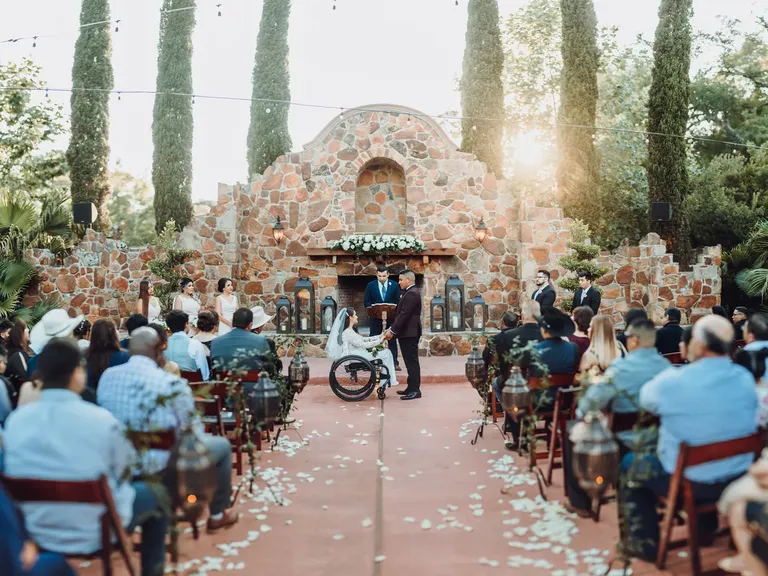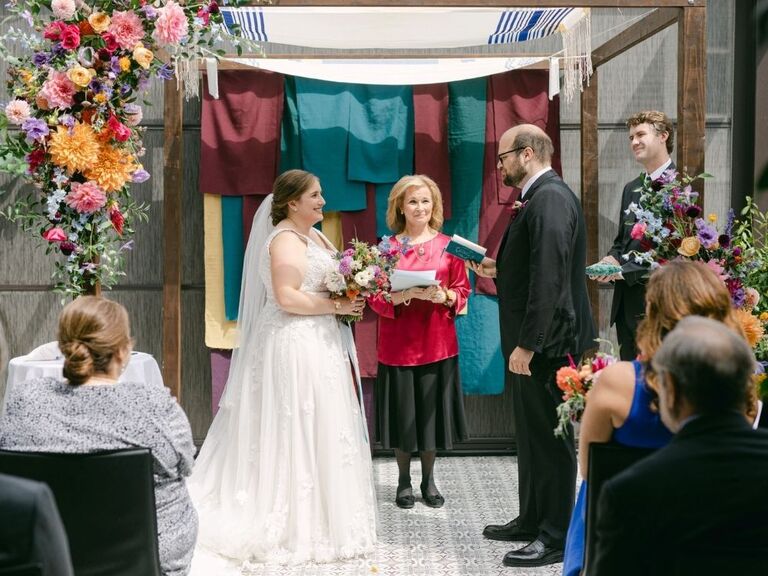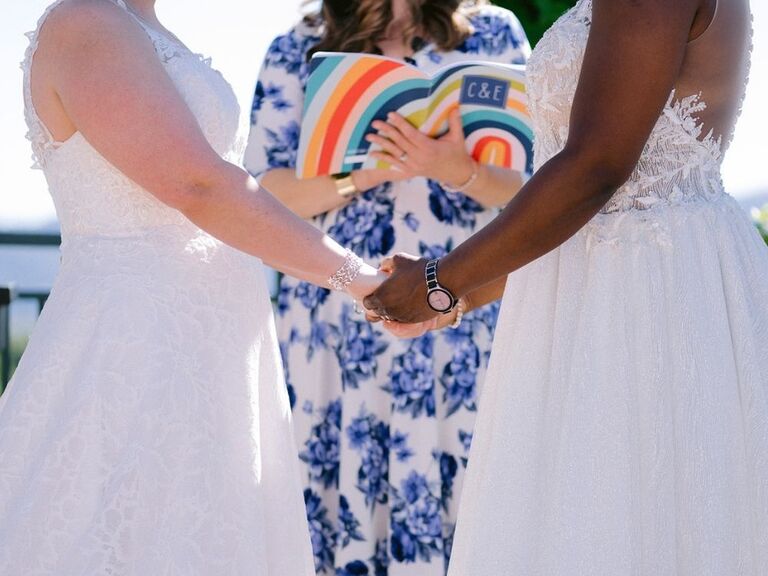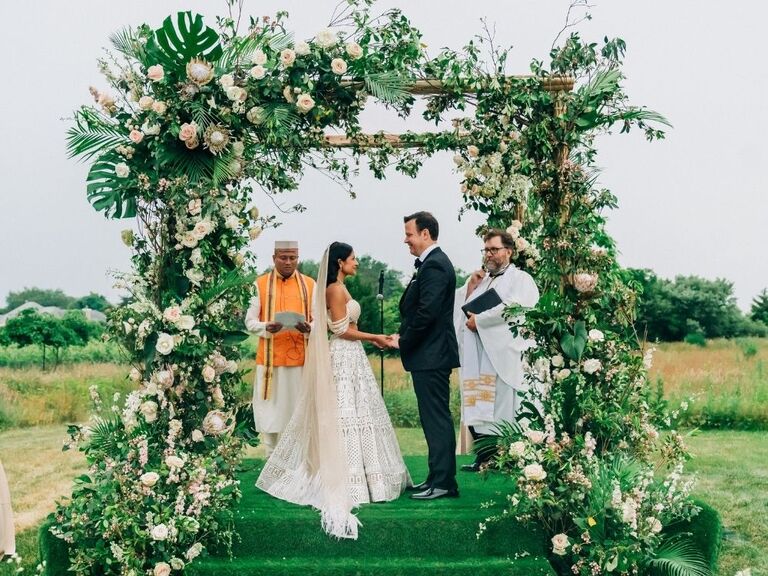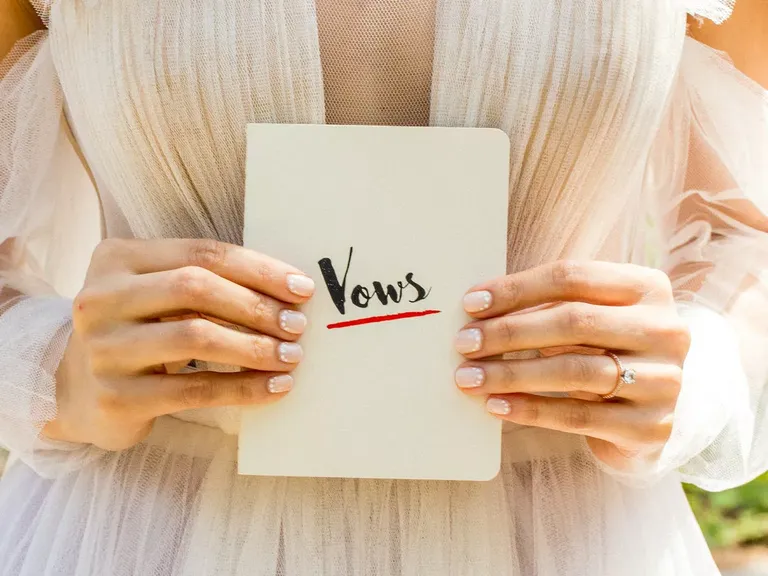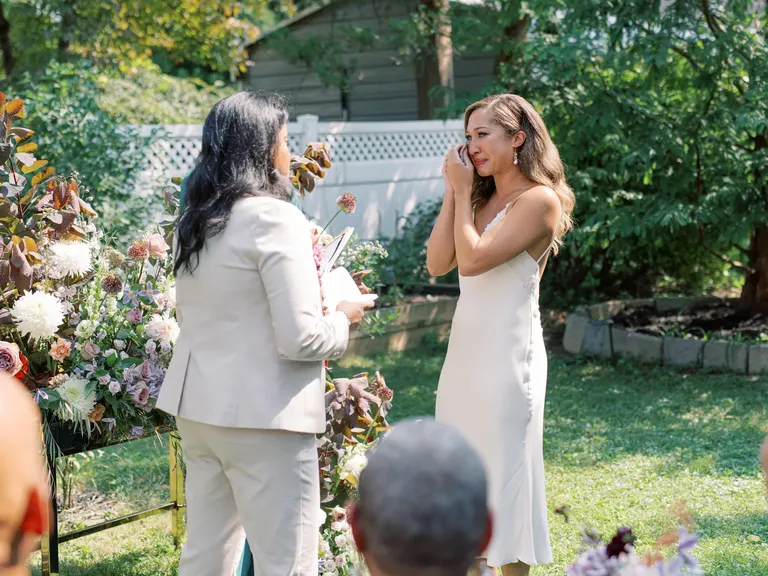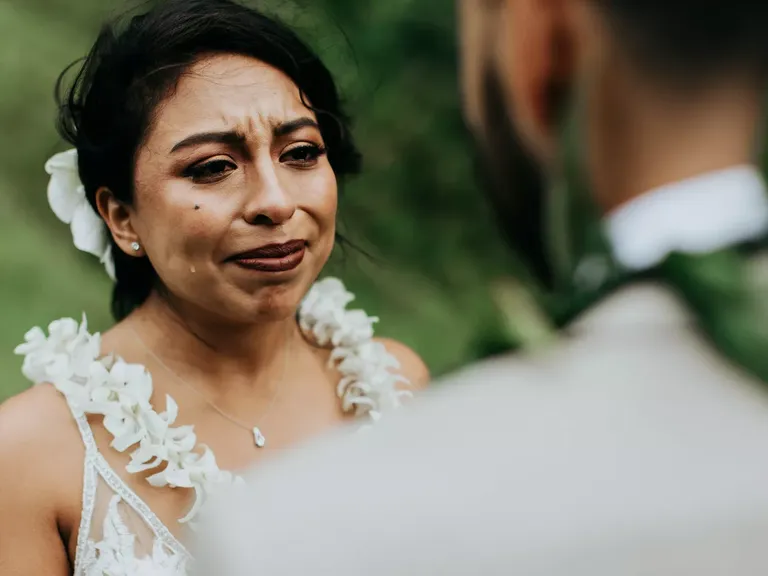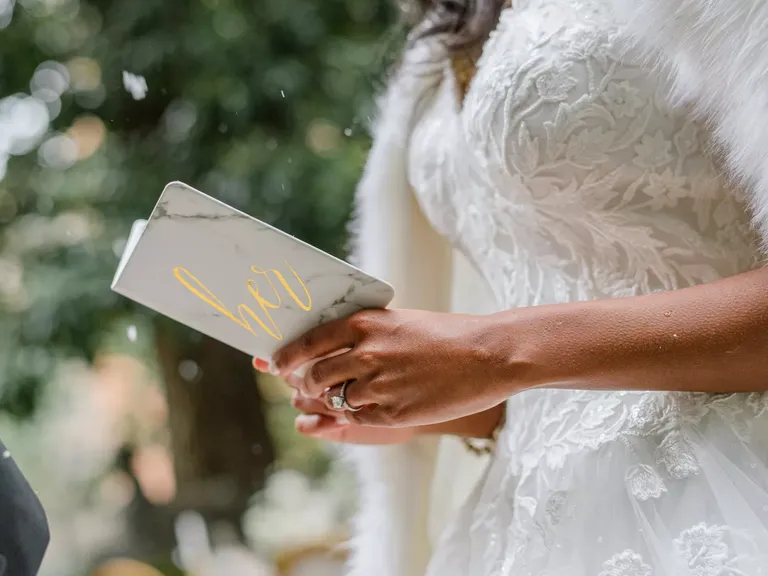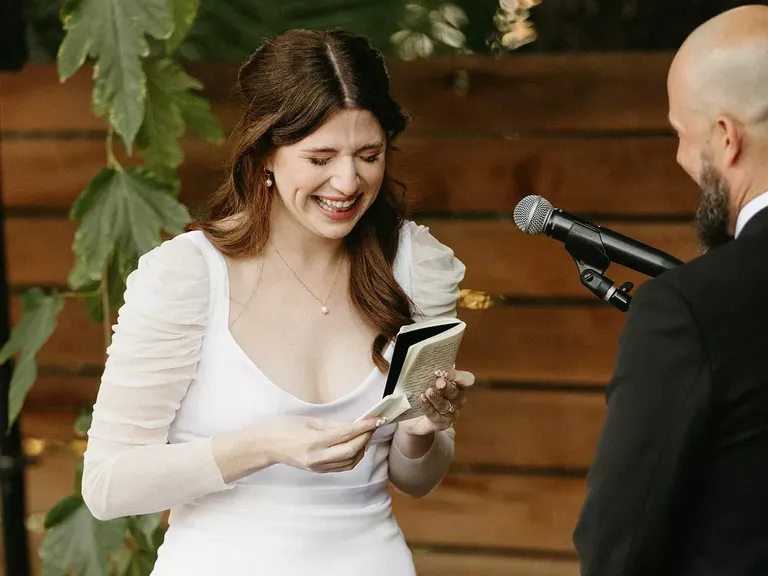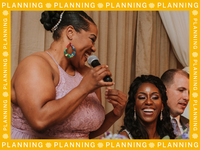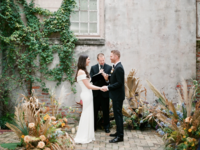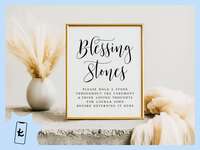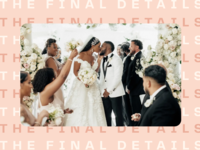Traditional Wedding Vows From Religions and Cultures Across the Globe
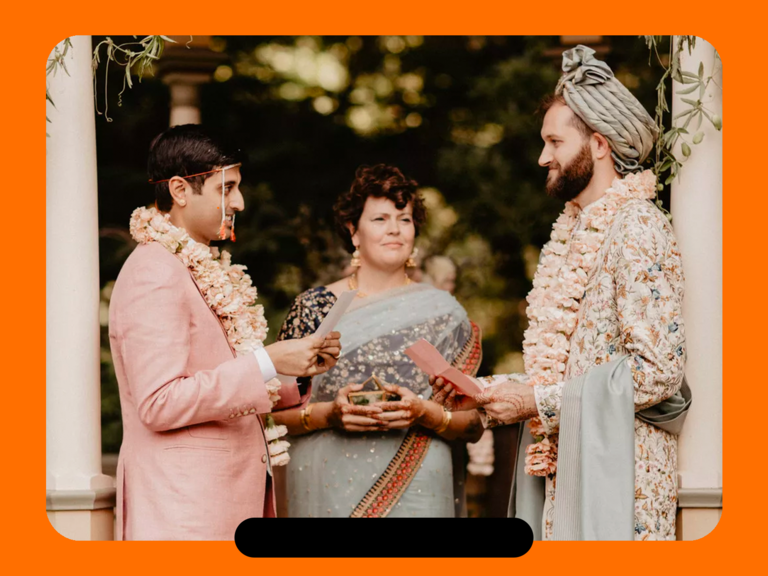
Looking through traditional wedding vows as inspiration can be immensely helpful when crafting your own wedding ceremony. After all, a wedding is a chance to acknowledge your heritage while also celebrating the new journey you're stepping into. In the vein, many to-be-weds choose to honor their religion throughout the wedding day and incorporating traditional vows from your faith or culture is a great way to do just that. Whether you plan to recite the traditional marriage vows verbatim or just use them as a starting point template for personalizing your own wedding vows, traditional marriage vows that have been passed down for generations are great inspiration for any wedding ceremony.
As you're planning your nuptials, work in tandem with your wedding officiant to craft a ceremony that beautifully reflects your partnership with standard wedding vows that pay homage to your heritage. And if you need even more inspiration after perusing these traditional wedding vows, take a peek at example wedding vows from real couples to get your creative juices flowing. While you and your partner read through the types of marriage vows below, make note of the ones that you feel drawn to—those promises may just be the marriage vows you end up reciting at your nuptials.
Traditional wedding vows in this story:
Catholic | Christian | Celtic | Viking | Pagan | Jewish | Buddhist | Baptist | Methodist | Spanish | Episcopal | Lutheran | Apache | Hindu | Muslim | Anglican | Presbyterian | Quaker | Cherokee | Civil | Greek | Interfaith | Nondenominational | Unitarian Universalist | Hawaiian | Mormon | Japanese | Sikh | Ethical Humanist
Plus: Traditional Wedding Vow Tips
1. Catholic Wedding Vows
A Catholic wedding mass is highly liturgical and follows a very structured traditional format. In light of this, there are only two wedding vow variations approved by the Vatican for use in Catholic wedding ceremonies. Couples are generally discouraged from deviating from the traditional vows that have been passed down for generations.
Traditional Catholic Wedding Vows: I, ___, take you, ___, for my lawful wife/husband, to have and to hold from this day forward, for better, for worse, for richer, for poorer, in sickness and health, until death do us part.
I, ___, take you, ___, to be my husband/wife. I promise to be true to you in good times and in bad, in sickness and in health. I will love and honor you all the days of my life.
2. Christian Wedding Vows
Traditional Christian wedding vows are some of the most commonly exchanged vows and, chances are, you're familiar with Christian wedding vows (even if you didn't realize it!).
Traditional Protestant Christian Wedding Vows: In the name of God, I, ____, take you, ____, to be my husband/wife, to have and to hold from this day forward, for better, for worse, for richer, for poorer, in sickness and in health, to love and to cherish, until we are parted by death. This is my solemn vow.
3. Celtic Wedding Vows
Celtic wedding vows are steeped in generations of tradition and are a great option for couples who want to honor their Irish, Scottish or Welsh heritage. For those infusing Celtic traditions into their wedding, a handfasting ceremony is a nice way to complement your Celtic marriage vows.
Traditional Celtic Wedding Vows: Today, we swear by love and peace to stand, hand to hand and heart to heart. Mark, O Spirit, and hear us now, this we confirm our Sacred Vow.
4. Viking Wedding Vows
Curious about how Viking and Norse wedding vows historically were written? The traditional marriage vows for Viking and Norse weddings were straightforward and pragmatic, much like the nature of Norse society.
Traditional Viking Wedding Vows: I, ____, take you, ____, to be my lawfully wedded spouse, to have and to hold, from this day forward, for better or for worse, for richer or for poorer, in sickness and in health, until death do us part. By the strength of Thor's hammer, I vow to protect and cherish you. By the light of the sun and the power of the gods, I pledge to love and honor you always.
There shall be one end for us both; one bond after our vows; nor shall our first love aimlessly perish. Happy am I to have won the joy of such a consort; I shall not go down basely in loneliness to the gods of Tartarus.
With this ring, I thee wed. I give you my heart and soul, and promise to love and cherish you always. I promise to be your faithful partner, to stand by your side through thick and thin, and to love and support you for all eternity.
5. Pagan Wedding Vows
Pagan wedding vows and Wiccan wedding vows do not contain references to God as many traditional and religious wedding ceremony vows do. Instead, the polytheistic wedding vows may contain references to entities like Mother Earth or Father Sky.
Traditional Pagan Wedding Vows: I promise to love thee wholly and completely without restraint, in sickness and in health, in plenty and in poverty, in life and beyond, where we shall meet, remember, and love again. I shall not seek to change thee in any way. I shall respect thee, thy beliefs, thy people, and thy ways as I respect myself.
6. Jewish Wedding Vows
A traditional Jewish ceremony generally doesn't include spoken wedding vows. Instead, the ring exchange and seven blessings (Sheva B'rachot) customarily represent the marriage contract. However, many modern couples like the idea of sharing self-penned promises and choose to include vows in their nuptials.
Traditional Reform Jewish Wedding Vows: Do you,___, take_____ to be your wife/husband, promising to cherish and protect her/him, whether in good fortune or in adversity, and to seek together with her/him a life hallowed by the faith of Israel?
Traditional Conservative Jewish Wedding Vows: Do you, ____, take _____ to be your lawfully wedded wife/husband, to love, to honor and to cherish?
7. Buddhist Wedding Vows
A unique differentiator of Buddhist wedding vows is that they're not required to be spoken aloud. While to-be-weds are certainly able to exchange vows verbally, this isn't a requirement for Buddhist wedding ceremonies. Whether exchanged silently or out loud, Buddhist wedding vows will express a couple's desire to work together toward achieving enlightenment.
Traditional Buddhist Wedding Vows: Today we dedicate ourselves completely to each other, in body, speech, and mind. Throughout this life, in every situation, in wealth or poverty, in health or sickness, in happiness or difficulty, we promise to work to help each other perfectly. We commit to working together in our relationship toward the purpose of attaining enlightenment by striving to always perfect our kindness and compassion toward all sentient beings.
8. Baptist Wedding Vows
For couples looking to honor their Protestant faith through traditional Christian marriage vows, the Baptist template is a great place to start. The Baptist church is the largest Protestant Christian denomination in the United States, accounting for a third of American Protestant Christians. As such, there's a good chance that your family, or even some of the guests in attendance, feel deeply connected to the wedding traditions of the denomination.
During the exchange of vows at a Baptist wedding ceremony, which takes place directly before the exchange of wedding rings, partners will share the promises and commitments they're making. The words exchanged will generally follow a structured format in accordance with the Baptist church. To begin, one partner usually vows to take their partner as a faithful wife or faithful husband or as a wedded husband or wedded wife. A mention of those witnessing the union, both physically and in the spiritual realm, is generally included—they may say something along the lines of before God and His Church.
Traditional Baptist Wedding Vows: I, ________, take thee ________, to be my husband/wife, and before God and these witnesses I promise to be a faithful and true husband/wife.
9. Methodist Wedding Vows
The United Methodist Church views marriage as a sacred covenant representing the Baptismal Covenant. In essence, entering into a marriage contract is another step in a person's walk of faith and discipleship which they first entered into when they were baptized. As such, Methodist wedding vows should highlight the ways that you'll live in marriage that are in accordance to, and supportive of, your faith journey as a disciple of Jesus Christ.
Traditional Methodist Wedding Vows: Will you have this woman/man to be your wife/husband, to live together in holy marriage? Will you love her/him, comfort her/him, honor, and keep her/him in sickness and in health, and forsaking all others, be faithful to her/him as long as you both shall live?
In the name of God, I, ______, take you, ______, to be my wife/husband, to have and to hold from this day forward, for better, for worse, for richer, for poorer, in sickness and in health, to love and to cherish, until we are parted by death. This is my solemn vow.
10. Spanish Wedding Vows
Throughout much of Latin America, Spanish wedding vows are exchanged during wedding ceremonies. The Spanish wedding vows below are a standard base commonly used by couples.
Traditional Spanish Wedding Vows: Yo, ________, te quiero a ti, _______, como mi esposo/ esposa, y me entrego a ti, y prometo serte fiel en las alegrías y en las penas, en la salud y en la enfermedad, todos los días de mi vida. Yo, Novio/Novia, te tomo a ti, Novia/Novia , como mi esposa. para tenerte y sostenerte de hoy en adelante, para bien or para mal, en riqueza o en pobreza, en enfermedad o en salud, para amarte y respetarte, hasta que la muerte nos separe. Esta es mi solemne promesa.
Spanish Wedding Vows Translation: I, ________, love you, _______, as my husband/ wife, and I give myself to you, and I promise to be faithful to you in joy and in sorrow, in health and in sickness, all the days of my life. I, Groom/Bride, take thee, Bride/Groom, to be my wedded wife, to have and to hold / from this day forward, for better, for worse, for richer, for poorer, in sickness and in health, to love and to cherish, till death do us part. This is my solemn vow.
11. Episcopal Wedding Vows
Episcopal wedding vows are taken from the Episcopal Church's Book of Common Prayer. The Episcopal church is known for its highly inclusive support of the LGBTQ+ community and is a great option for couples who want a religious ceremony that still feels affirming and modern.
Traditional Episcopal Wedding Vows: ______, wilt thou have this woman/man to be thy wedded wife/husband to live together after God's ordinance in the Holy Estate of matrimony? Wilt thou love her/him? Comfort her/him, honor and keep her/him, in sickness and in health, and forsaking all others keep thee only unto her/him as long as you both shall live?
In the name of God, I, ______, take you, ______, to be my wife/husband, to have and to hold from this day forward, for better, for worse, for richer, for poorer, in sickness and health, to love and to cherish, until we are parted by death/ till death do us part. This is my solemn vow.
12. Lutheran Wedding Vows
In the Lutheran tradition, which in the United States is made up of three major Lutheran church bodies, the Evangelical Lutheran Church in America, Lutheran Church–Missouri Synod and Wisconsin Evangelical Lutheran Synod, matrimony is a covenant of fidelity. As such, wedding vows are a couple's chance to express their promise of faithfulness to their partner.
Traditional Lutheran Wedding Vows: I take you, ______, to be my wife/husband from this day forward, to join with you and share all that is to come, and I promise to be faithful to you until death parts us.
I, ______, take you, ______, to be my wife/husband, and these things I promise you: I will be faithful to you and honest with you; I will respect, trust, help, and care for you; I will share my life with you; I will forgive you as we have been forgiven; and I will try with you better to understand ourselves, the world and God; through the best and worst of what is to come, and as long as we live.
13. Apache Wedding Vows
An element of some Apache wedding ceremonies that to-be-weds may be familiar with is the Apache wedding blessing. While this is a lovely element to include in the wedding ceremony, couples should be aware that it doesn't actually have roots with the Apache tribe. The poem, while beautiful, was written by a non-Indigenous author for a Western novel, which was later turned into a movie. As with all vows and readings you may be considering for your wedding ceremony, it's important to understand the meaning and history of every text you're considering before you commit to including it in the wedding ceremony script.
Traditional Apache Wedding Vows: Now you will feel no rain, for you will be shelter to each other. Now you will feel no cold, for each of you will be warmth to the other. Now there is no more loneliness, for each of you will be companion to the other. Now you are two bodies, but there is only one life before you. Soon you will go to your resting place, to enter into the days of your togetherness. May your days be good and long upon the earth.
14. Hindu Wedding Vows
The vow exchange during a traditional Hindu wedding ceremony involves taking seven steps or saptapadi around a holy fire known as agni. Each of the seven steps coincides with a promise the couple is making to each other. These seven steps, along with the other rituals included in a Hindu wedding, serve to bond the couple in wedded matrimony.
Traditional Hindu Wedding Vows: Let us take the first step to provide for our household a nourishing and pure diet, avoiding those foods injurious to healthy living. Let us take the second step to develop physical, mental and spiritual powers. Let us take the third step to increase our wealth by righteous means and proper use. Let us take the fourth step to acquire knowledge, happiness and harmony by mutual love and trust. Let us take the fifth step so that we are blessed with strong, virtuous and heroic children. Let us take the sixth step for self-restraint and longevity. Finally, let us take the seventh step and be true companions and remain lifelong partners by this wedlock.
15. Muslim Wedding Vows
Most Muslim couples do not recite vows, but rather heed the words of the imam (cleric), who speaks about the meaning of marriage and the couple's responsibilities to each other and to Allah during the nikah, or marriage ceremony. At the end of this ritual, the couple consents to become husband and wife, and they are blessed by the congregation. However, some modern Muslim couples do choose to recite vows inspired by the examples below.
Traditional Muslim Wedding Vows: Bride: I, ___, offer you myself in marriage in accordance with the instructions of the Holy Quran and the Holy Prophet, peace and blessing be upon him. I pledge, in honesty and with sincerity, to be for you an obedient and faithful wife.
Groom: I pledge, in honesty and sincerity, to be for you a faithful and helpful husband.
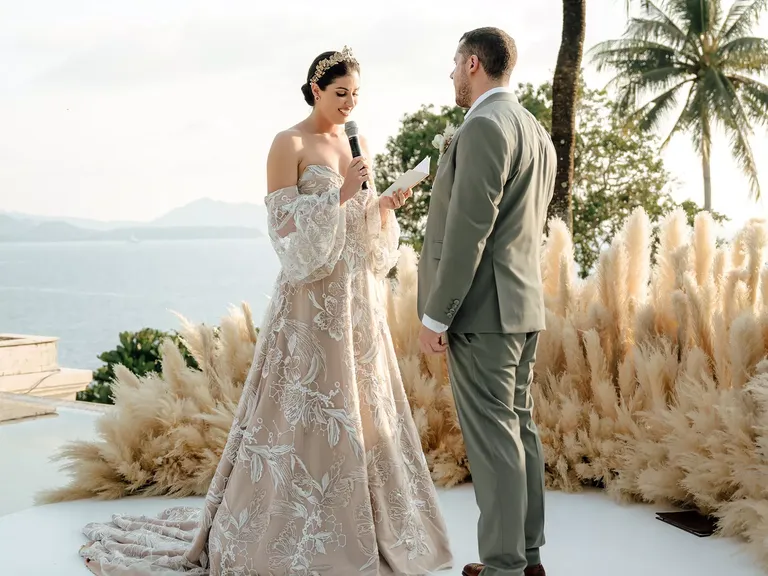
16. Anglican Wedding Vows
Anglican wedding vows are the traditional Christian wedding vows for couples tying the knot in accordance with the Anglican tradition. The Anglican Church, which is overseen by the Archbishop of Cantebury, was formed during the Protestant Reformation. The denomination is notable for its use of The Book of Common Prayer as a basis for liturgy. As such, Anglican wedding vows can be taken from that collection of writings.


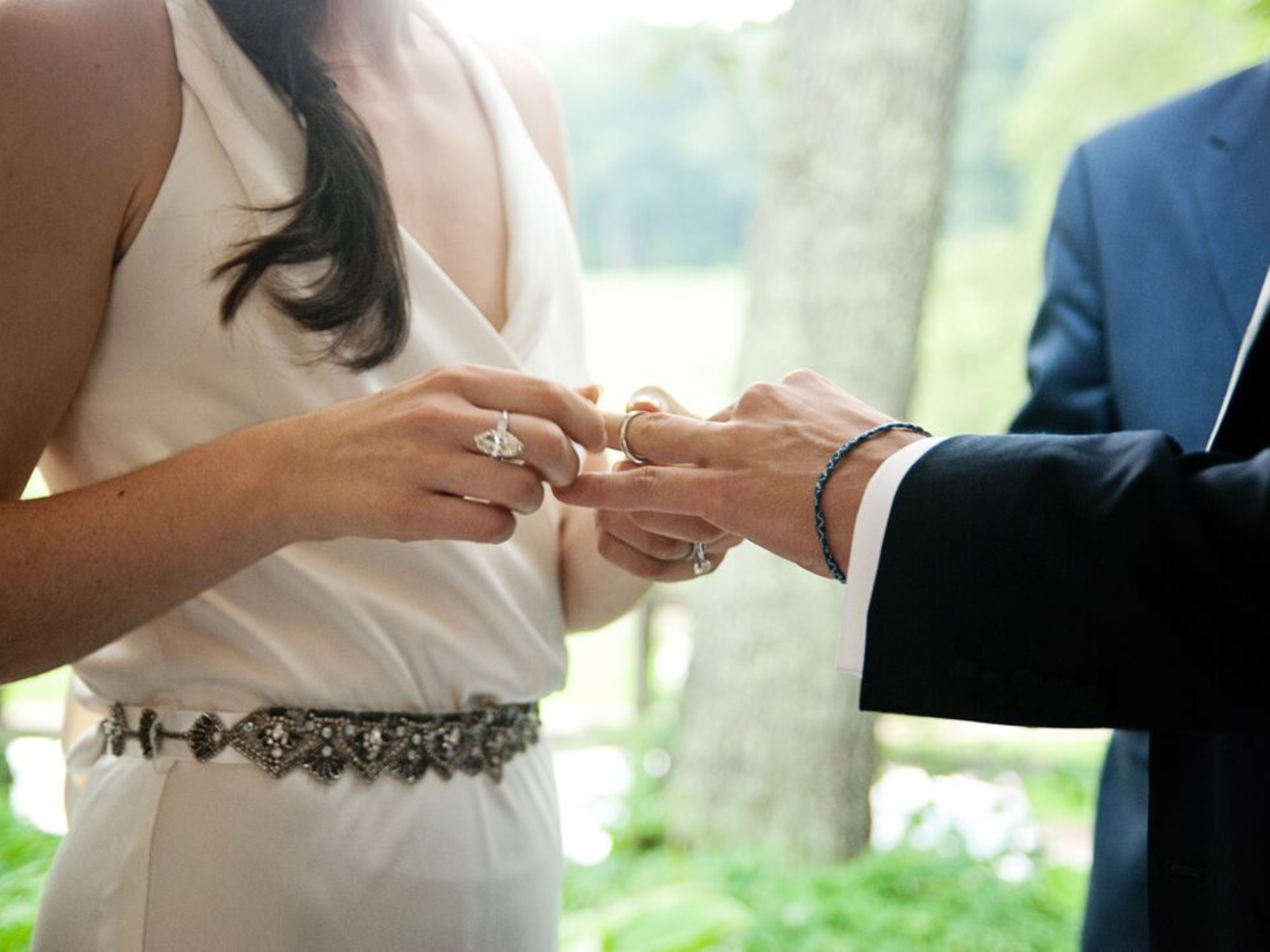
Traditional Anglican Wedding Vows: I, ____, take thee, ____, to my wedded wife/hisband, to have and to hold from this day forward, for better for worse, for richer for poorer, in sickness and in health, to love and to cherish, till death us do part, according to God's holy ordinance; and thereto I plight thee my troth. WThisITH this ring I thee wed, with my body I thee worship, and with all my worldly goods I thee endow: In the Name of the Father, and of the Son, and of the Holy Ghost. Amen.
17. Presbyterian Wedding Vows
Presbyterian wedding vows will generally follow a format set by either the Presbyterian Church (USA) (PCUSA) or the Presbyterian Church in America (PCA). As the pastor will explain ahead of the vow exchange, Presbyterian vows are the promises that bind a couple together in matrimony—and the words used are generally pulled from the Common Book of Worship.
Traditional Presbyterian Wedding Vows: ______, wilt thou have this woman/man to be thy wife/husband, and wilt thou pledge thy faith to him/her, in all love and honor, in all duty and service, in all faith and tenderness, to live with her/him, and cherish her/him, according to the ordinance of God, in the holy bond of marriage?
I, ______, take you, ______, to be my wedded wife/husband, and I do promise and covenant, before God and these witnesses, to be your loving and faithful husband/wife, in plenty and want, in joy and in sorrow, in sickness and in health, as long as we both shall live.
18. Quaker Wedding Vows
Weddings celebrated in the Quaker tradition as part of the Religious Society of Friends are unqiue in that they are self-uniting. As such, there is no officiant present during the ceremony, which focuses on simplicity in accordance with the Quaker way of life.
As part of the wedding ceremony, the witnesses present will also sign a Quaker wedding certificate. The wording used for wedding vows and for the Quaker wedding certificate is extremely personal since Quakers believe that only God can unite them in marriage.
Traditional Quaker Wedding Vows: In the presence of God and these our friends I take thee, ______, to be my husband/wife, promising with Divine assistance to be unto thee a loving and faithful husband/wife so long as we both shall live.
19. Cherokee Wedding Vows
Cherokee wedding ceremonies are steeped in rich tradition and often include vows, readings and poems that have been passed down for generations. During a Cherokee wedding ceremony, the couple may choose to honor forces of nature, notably fire, wind and water, for the blessings they bring to the new marriage.
Traditional Cherokee Wedding Vows: God in heaven above, please protect the ones we love. We honor all you created as we pledge our hearts and lives together. We honor Mother Earth and ask for our marriage to be abundant and grow stronger through the seasons. We honor fire and ask that our union be warm and glowing with love in our hearts. We honor the wind and ask that we sail through life safe and calm as in our father's arms. We honor water to clean and soothe our relationship—that it may never thirst for love. With all the forces of the universe you created, we pray for harmony as we grow forever young together. Amen.
20. Civil Wedding Vows
If religious vows aren't quite your speed, a civil wedding ceremony with courthouse wedding vows may be the way to go. Given that you don't have years of religious tradition to consider, civil wedding vows are highly customizable and a good option for couples who want classic marriage vows that aren't faith-based.
Traditional Civil Wedding Vows: I love you, and promise to always be your truest and best friend. I vow to support and respect you, to be patient and gracious toward you, to work together jointly with you as we strive to achieve our shared goals. I promise to accept you fully and unconditionally and to share my life with you from now until forever.
21. Greek Orthodox Wedding Vows
Though Greek and Eastern Orthodox wedding ceremonies are rife with tradition, they traditionally don't feature wedding vows. The wedding ceremony is viewed as the couple's joining through the eyes of God, rather than the law, so formal vows are not typically included. However, there are many elements, like the crowning, candle lighting and common cup that take place during the ceremony to represent the couple's bond. My modern couples like the idea of exchanging verbal vows and may share promises with each other during a separate, private moment together.
Traditional Greek Orthodox Wedding Vows: I, ___, take you, ___, as my wedded wife/husband and I promise you love, honor and respect; to be faithful to you, and not to forsake you until death do us part. So help me God, one in the Holy Trinity and all the Saints.
22. Interfaith Wedding Vows
Couples that come from different religious or cultural backgrounds may want to craft blended wedding vows that include elements from both upbringings. Working with your officiant, or even two officiants if you want someone from both religions or cultures to preside, is the best approach when it comes to crafting your vows and deciding what phrases to include and which ones to skip.
Many couples we work with want to honor their religions in a cultural sense to honor their families instead of a faith-based one, says VillaRamos. Regardless of how couples want to honor their religion, this is a great opportunity to discuss the parts of their faith that resonate with them and the parts that don't. Couples may even find that there are pieces of scripture or their belief system that are similar in many ways. In making these discoveries together, we recommend that couples highlight the parts of their faith that they want to include in their wedding vows as well as their daily lives. After all, when times get tough, most couples think back to the wedding vows they made so include something that will ground you during those times.
Traditional Interfaith Wedding Vows: With all my love, in front of our dear friends and family, I take you to be my partner. I vow to be your friend, companion and lover. I promise to be your partner in parenthood (if we're so blessed), your ally in times of disagreement and your greatest source of support. All the days that I live, I promise to be adventure alongside you, comfort you during disappointment and offer you strength in times of struggle. I vow to trust you fully and listen patiently, now and always.
23. Nondenominational Wedding Vows
Since nondenominational Christians are not bound by the traditions of a church governing body or denomination, there's much flexibility when crafting nondenominational wedding vows. Couples, in partnership with their officiant, can decide on what promises best fit their relationship and what they want to proclaim before God and loved ones.
Traditional Nondenominational Christian Wedding Vows: I, ______, take you, ______, to as you are. Loving everything that I know of you, trusting what I have yet to discover, I vow to respect and trust you, as long as we both shall live, through everything that life brings our way.
______, I take you as my wife/husband, with your faults and your strengths, as I offer myself to you with my faults and my strengths. I will help you when you need help, and turn to you when I need help. I choose you as the person with whom I will spend my life.
24. Unitarian Universalist Wedding Vows
A Unitarian Universality (UU) wedding is a highly emotional affair and the vows are give the couple the chance to express their promises to each other as they enter into a lifelong partnership. While they're incredibly customizable, UU vows should still get to the heart of why, out of all the people in the world, you chose your partner and what vows you're committing to with that person.
Traditional Unitarian Universalist Wedding Vows: ______, will you take ______ to be your wife/husband; love, honor and cherish her/him now and forevermore? ______, will you take ______ as your wife/husband, will you pledge to share your life openly with her/him, to speak the truth to her/him, in love? Will you promise to honor and tenderly care for her/him, to encourage her/him fulfillment as an individual through all the changes in your lives? ______, will you have this woman/man, ______, to be your wedded wife/husband, to live together in marriage, will you love her/him, comfort her/him, honor her/him and keep her/him, in sickness and in health, in sorrow and in joy, so long as you both shall live? ______, do you take this woman/man, ______, to be your wife/husband? Do you pledge to share your life openly with her/him and to speak the truth to her/him in love? Will you comfort her/him, honor her/him and keep her/him, in sickness and in health, in sorrow and in joy, so long as you both shall live?
25. Hawaiian Wedding Vows
In addition to the Hawaiian wedding vows outlined below, many traditional Hawaiian weddings will include a lei exchange and a Hawaiian blessing.
Traditional Hawaiian Wedding Vows: I, _____, receive you, _____, as my partner and love. Beside me and apart from me, in laughter and in tears, in sickness and in health, in conflict and serenity, asking that you be no other than yourself. Loving what I know of you and trusting what I do not know in all the ways that life may bring. _____, with this ring, I promise to grow with you, to build our love, to speak openly and honestly, to listen to you, and to love and cherish you for all the days ahead. From this day forward, you shall not walk alone. My heart will be your shelter and my arms will be your home.
26. Mormon Wedding Vows
In accordance with the LDS Church, Mormon wedding vows take place during the ceremony's sealing ritual. The vows that are exchanged as the standard Mormon wedding vows outlined below.
Traditional Mormon Wedding Vows: Brother ______, do you take Sister ______ by the right hand and receive her unto yourself to be your lawful and wedded wife for time and all eternity, with a covenant and promise that you will observe and keep all the laws, rites, and ordinances pertaining to this Holy Order of Matrimony in the New and Everlasting Covenant, and this you do in the presence of God, angels, and these witnesses of your own free will and choice?
Sister ______ do you take brother ______ by the right hand and give yourself to him to be his lawful and wedded wife, and for him to be your lawful and wedded husband, for time and all eternity, with a covenant and promise that you will observe and keep all the laws, rites and ordinances pertaining to this Holy Order of Matrimony in the New and Everlasting Covenant, and this you do in the presence of God, angels, and these witnesses of your own free will and choice?
27. Japanese Wedding Vows
Japanese wedding vows are typically very straightforward and succinct. There are two formats couples may choose between. Sometimes, the officiant will read a list of promises and ask the to-be-wed if they commit to those promises. Alternatively, as seen below, to-be-weds will recite all the promises on their own.
Traditional Japanese Wedding Vows: Watakushi wa kono josei/ danshari to kekkon-shi fū futo narou to shitemasu. Watashi wa kenkōna toki mo sō janai toki mo kono hito o aishite kono hito o uyamai kono hito o nagusame kono hito o tasuke watakushi no inochi no kagiri kataku sesshō o mamoru koto o chikaimasu.
わたくしはこの女性/断捨離と結魂師 ふうふとなろうとしてます。わたしは健康なときも そ じゃないときも この人を愛して この人をうやまい この人をなぐさめ この人をたすけ わたくしのいのちのかぎり かたく殺生を守ることを ちかいます。
Japanese Wedding Vows Translation: I marry this man/woman. No matter what health situations may come, I will love this person, respect this person, console this person, help this person, until death, protecting their fidelity—these things I swear.
28. Sikh Wedding Vows
Sikh wedding vows are a recitation of four wedding hymns known as the Laavan. Each hymn describes a different spiritual stage of marriage. The fourth verse is outlined below.
Traditional Sikh Wedding Vows: Har chou-tha-rree laav man sehaj bha-i-aa har paa-i-aa bal raam jeeo. Gurmukh mil-i-aa su-bhaa-e har man tan mee-thaa laa-i-aa bal raam jeeo. Har mee-thaa laa-i-aa mere prabh bhaa-i-aa andin har liv laa-ee. Man chind-i-aa fal paa-i-aa su-aamee har naam vajee vaa-dhaa-ee. Har prabh thaakur kaaj rachaa-i-aa dhan hir-dhai naam vi-gaa-see. Jan naanak bolae chou-thee laa-vai har paa-i-aa prabh avin-aa-see.
Sikh Wedding Vows Translation: In the fourth round of the marriage ceremony, the mind becomes peaceful having found the Lord. The Guru's disciple meets the Lord with intuitive ease when surrendering sweetly the mind soul and body. The Lord seems sweet to the one possessed by God who is lovingly attuned night and day on the Lord ever. The heart's mind becomes fruitful and attains its desire when the Lord's name resoundingly resonates within. The Lord God Master blends with the bride whose heart blossoms in the illumination of his name forthwith. Servant Nanak proclaims that, in this, the fourth round of the marriage ceremony the eternal Lord God is attained.
29. Ethical Humanist Wedding Vows
Similar in nature to civil wedding vows, ethical humanist wedding vows are for humanists who practice a secular way of life, but place great emphasis on living ethically and morally. The main difference between a civil wedding ceremony and an ethical humanist one is that humanists refer to the officiant as the celebrant. However, like with civil wedding vows, ethical humanist wedding vows are highly customizable.
Ethical Humanist Wedding Vow Example: Today, in front of our friends and family, I give you everything I am and everything I will grow to be. I love you, and I vow to be your truest friend. I will share your hopes and dreams while working to help you achieve the goals you hold dear. I promise to always be right by your side and to listen patiently with an open heart. I pledge to you my fidelity, honesty, compassion and forgiveness. I vow to love you always, no matter what the future holds. I will be your most loyal confidant and friend, and your loving husband/wife because you are my heart and my soul now and forever.
Traditional Wedding Vow Tips
Now that you've read over the traditional wedding vows from 28 religions and cultures around the world it's time to get to work on your own ceremony promises. Keep these traditional wedding vow tips in mind as you plan your marriage vows.
Work With an Officiant
Along with the traditional marriage vows outlined above, your wedding officiant will help you sort through everything you need to know and prepare for your wedding ceremony. A professional wedding officiant is a great resource for couples, especially those planning to exchange vows that won't be overseen by a clergy member.
Stay True to Your Relationship
When it comes to traditional wedding vows for officiant Daniela VillaRamos, the New York-based officiant of Once Upon a Vow says that "the best advice we can give to couples with respect to their vows is to stay true to themselves. Vows are an extension of the values a couple holds dear in their lives and promise to instill into their marriage. For better AND for worse, baby!" VillaRamos goes on to say that "whether couples choose to write their own vows or stick to traditional ones, the same advice holds. Ask yourself: Do these vows capture 'US' and our vision for our marriage? Are these vows too broad, too simple, too rooted in the patriarchy? If you find that you're straddling between writing your own vows and using traditional ones, we challenge you to look past the binary and find options that suit you best. You can make your own rules! You can choose to write your own vows AND use the parts of traditional vows that resonate most. Your wedding vows are a little piece of your heart that affirms your commitment and love to your partner, best friend, sous-chef, little spoon, co-parent, and whatever other cute roles you may have or identify with. These words are an extension of your love that you'll look back on especially when experiencing challenges."

